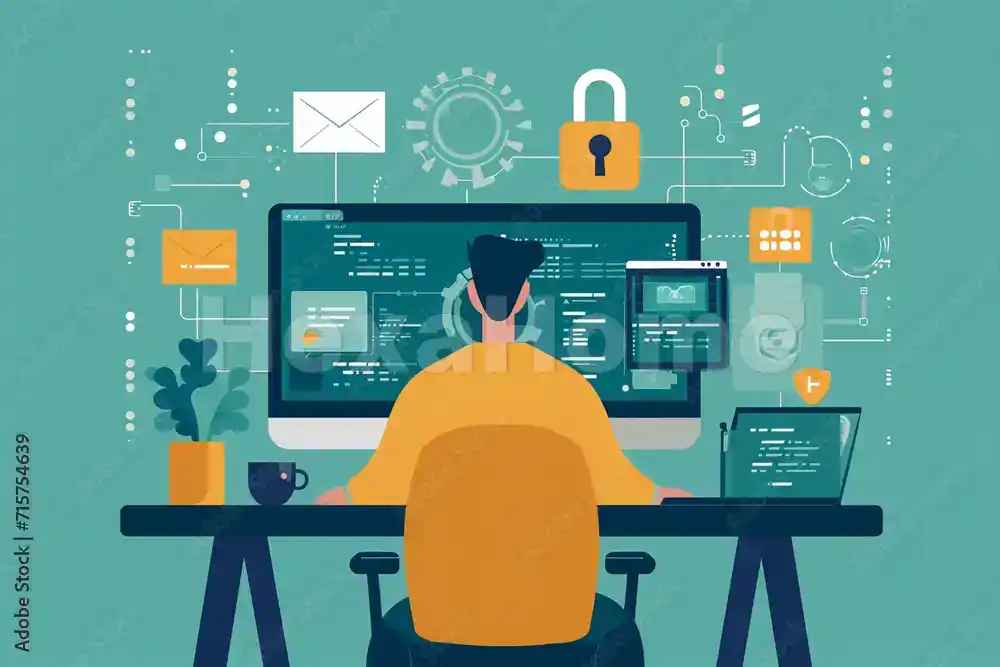Ethical Hacking: The Guardian of Cybersecurity
Updated on : 26 November, 2024, 10:30 AM IST

Image Source: freepik.com
Table Of Contents
In today’s digital world, where technology permeates every aspect of our lives, the importance of cybersecurity cannot be overstated. As cyber threats continue to evolve, the need for skilled professionals who can protect sensitive information has become critical. This is where ethical hacking comes into play.
What is Ethical Hacking?
Ethical hacking is a way of testing computer systems and networks to find weaknesses or vulnerabilities that could be exploited by malicious hackers. Unlike traditional hackers, who break into systems for personal gain or to cause harm, ethical hackers have permission to hack into systems to help improve security. They work with organizations to identify problems before bad actors can take advantage of them.
Why is Ethical Hacking Important?
-
Preventing Cyber Attacks: With cybercrime on the rise, organizations face significant risks if they do not address vulnerabilities in their systems. Ethical hackers help identify these weaknesses before they can be exploited.
-
Protecting Sensitive Data: Organizations often handle sensitive information, such as customer data and financial records. Ethical hacking helps safeguard this data from breaches that could lead to severe financial and reputational damage.
-
Compliance with Regulations: Many industries are subject to regulatory requirements regarding data protection (e.g., GDPR, HIPAA). Ethical hacking helps organizations comply with these regulations by identifying and addressing security gaps.
-
Building Trust with Customers: Demonstrating a commitment to cybersecurity through ethical hacking can enhance an organization’s reputation and build trust with customers.
The Ethical Hacking Process

Image Source: Adobe Stock
The process of ethical hacking typically follows a structured methodology:
- Planning and Reconnaissance:
- In this phase, ethical hackers gather information about the target system or network.
- Techniques such as footprinting (collecting information about the target) are used to understand potential attack vectors.
- Scanning:
- Tools are used to scan the target for open ports and services running on those ports.
- This phase helps identify potential entry points for attacks.
- Gaining Access:
- Ethical hackers attempt to exploit identified vulnerabilities to gain access to the system.
- Techniques used may include SQL injection or exploiting misconfigured services.
- Maintaining Access:
- Once access is gained, ethical hackers may attempt to create backdoors or other means of maintaining access for further testing.
- This phase helps assess how easily an attacker could maintain control over a compromised system.
- Analysis and Reporting:
- After completing the tests, ethical hackers analyze their findings.
- A detailed report is prepared outlining identified vulnerabilities, exploitation methods used, and recommendations for remediation.
Ethical Hacking in Different Industries

Image Source: pexels.com
Ethical hacking has applications across various sectors, each benefiting from enhanced security measures:
-
Finance and Banking:
- Ethical hackers test banking systems to protect against fraud and unauthorized access to customer data.
- They establish robust security measures for online banking platforms, ensuring the safety of financial transactions.
-
Healthcare:
- Ethical hackers secure electronic health records (EHRs) and medical devices from cyber threats, ensuring patient privacy and safety.
- They help healthcare organizations comply with laws like HIPAA by identifying vulnerabilities in their systems.
-
Government and Defence:
- Ethical hackers identify vulnerabilities in government systems to safeguard classified data and national security.
- They assess and strengthen the security of vital infrastructure against potential cyber attacks.
-
E-commerce:
- Ethical hackers ensure that e-commerce platforms are safe for customers by protecting payment gateways from cyber threats.
- They work to secure customer information, reducing the risk of identity theft and fraud.
-
Telecommunications:
- Ethical hackers assess telecom networks for vulnerabilities, ensuring secure communication channels for users.
- They implement measures to safeguard user data and prevent cyber attacks on telecommunications infrastructure.
-
Education:
- Ethical hackers protect research data and student records from breaches, maintaining the integrity of educational institutions.
- They assess vulnerabilities in academic systems to ensure a safe learning environment.
The Role of Ethical Hacking
Ethical hacking serves multiple roles within organizations:
-
Vulnerability Assessment: Ethical hackers perform thorough evaluations of systems to identify weaknesses that could be exploited by attackers. This proactive approach helps organizations address vulnerabilities before they can be targeted.
-
Security Training: They often provide training for staff on cybersecurity best practices, helping create a culture of security awareness within the organization
-
Incident Response Planning: Ethical hackers assist in developing incident response plans that outline how an organization should react in the event of a cyber attack, ensuring quick recovery and minimal damage.
Benefits of Ethical Hacking
-
Prevents Data Breaches: Ethical hackers find and fix security holes in systems before bad hackers can exploit them. This helps protect sensitive information, like personal and financial data, from being stolen.
-
Strengthens Security Measures: By testing how well a company’s security works, ethical hackers identify weaknesses that need to be improved. This makes it harder for cybercriminals to break into systems.
-
Ensures Compliance with Laws: Many industries have strict rules about protecting data. Ethical hacking helps organizations check if they are following these rules, which prevents legal issues and builds trust with customers.
-
Increases Employee Awareness: Ethical hackers often train employees to recognize potential security threats, like phishing emails. This helps everyone in the organization be more vigilant and cautious about security risks.
-
Saves Money: Although hiring ethical hackers costs money upfront, it can save organizations from expensive data breaches later on. Fixing problems early is much cheaper than dealing with the aftermath of a cyberattack.
Challenges in Ethical Hacking
-
Legal Issues: Ethical hackers must have permission to test a system. If they don’t get proper authorization, they could face legal trouble, even if their intentions are good. Understanding the laws around hacking is essential to avoid problems.
-
Changing Technology: Technology is always evolving, and new threats appear regularly. Ethical hackers need to keep learning about the latest tools and techniques to effectively protect systems from cyberattacks.
-
Risk of System Disruption: When ethical hackers test security, there’s a chance they could accidentally cause problems or downtime in the systems they’re testing. This can lead to data loss or affect business operations.
-
Finding the Right Skills: Not all ethical hackers have the same level of expertise. It can be challenging for organizations to find skilled ethical hackers who can effectively identify and fix vulnerabilities.
-
Managing Client Expectations: Clients may expect quick results or not fully understand what ethical hacking can achieve. Ethical hackers must communicate clearly to ensure clients have realistic expectations about the process and outcomes.
Conclusion
Ethical hacking is an essential practice in today’s cybersecurity landscape. By proactively identifying vulnerabilities and strengthening defenses, ethical hackers play a vital role in protecting sensitive information and ensuring compliance with regulations. The numerous benefits of ethical hacking—ranging from preventing data breaches to building customer trust—highlight its importance for organizations looking to enhance their security posture in an increasingly digital world.


